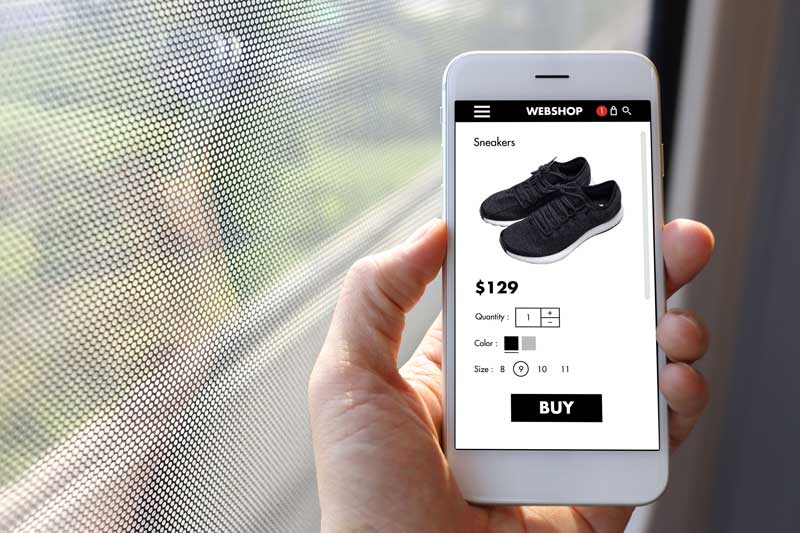There was a time that sneakerhead Nick Giarrusso would camp overnight – rain or shine, sometimes for days – just to get his hands on the latest Air Jordans. A time before sneaker reselling apps like StockX and GOAT dominated the market.
“When I first started camping out, I was hanging out with kids my age, but also people six or seven years older than me,” Giarrusso said. “I love the culture because it invites everyone in regardless of age, race or belief. It’s a big family.”
After camping out for the Jordan Concord 11s in 2011, Giarrusso saw a fellow camper flip five pairs for double their retail price in the mall parking lot. It opened his eyes: This wasn’t just a fun hobby; it also could be a business.
Giarrusso was right. Nearly a decade later, the global sneakers market is worth $100billion, a slice of which he owns thanks to Ambition Upstate, a sneaker reseller in Syracuse, N.Y., whose inventory includes more than 200 pairs of collectible footwear. Although it represents only a fraction of the market, sneaker reselling has become big business all over the globe and will soon be worth more than $6 billion, according to investment bank Cowen & Co. In a recent study, the bank estimates that number could grow to $30 billion by 2030.

With that kind of cash in play, sneakers are attracting attention not only from fashionistas and collectors, but also from investors, scholars and – unfortunately – fraudsters, whose sneaker scams are being stepped on by cloud-based technology.
Sneaker Selling Apps Step Up
Fueled by hip-hop artists, celebrities and social media influencers, the sneaker trend has risen to new heights in the digital age. Powered by cloud computing, sneaker selling apps and websites like GOAT, StockX and Grailed have revolutionized how sneaker collectors buy and sell their coveted footwear. So much so that a limited pair of Jordans or Nikes that retail for $170 can resell for a few thousand bucks. Case in point: A 16-year-old made headlines in 2017 for earning six figures reselling shoes to celebrities like DJ Khaled and Drake.
“Everything changes,” Giarrusso said. “If you can’t change with it, you’ll be stuck in the past, and that’s not where you want to be. But social media and sites like GOAT, StockX and Grailed have changed everything. More people than ever have access to sneakers and to the culture.”
Indeed, sneaker reselling has turned from a collector’s hobby into a full-time business. As a result, sneakers have literally stepped into the cultural spotlight. They’re even attracting high-end fashion brands like Dior and Sacai, which are partnering with traditional sportswear brands like Air Jordan and Nike to produce their own collectible kicks.
It’s a movement that shows no signs of slowing down. So great is its momentum, in fact, that college students have graduated from just wearing sneakers to also studying them. Carnegie Mellon University and Johnson C. Smith University, for example, have both offered classes that explore the complex and changing history of sneakers, encompassing topics such as child labor, race and economics through the lens of sneakers.
Some sneakerheads have even ditched the physical shoe. At the end of April, artist Fewocious sold $3.1 million worth of NFT sneakers in seven minutes. NFTs or non-fungible tokens are fetching millions of dollars in investments from companies big and small. Part of the appeal is ownership in the digital space, each NFT comes with a unique identification number that tracks ownership indefinitely.
“Most of my friends who are sneakerheads aren’t actually wearing their sneakers,” said John Crain, the co-founder of digital art marketplace SuperRare in an April interview with GQ. ”What do they do with their sneakers? They post pictures up on Instagram and then they go into a closet. The value of the sneaker is in its digital cache.”
Kicking Out Sneaker Scams
With so much money on the line, counterfeit sneakers have become big business. In fact, the underground market – worth $450 billion worldwide – is even bigger than the legal market. In October 2019, a single seizure by U.S. Customs and Border Protection in California yielded more than 14,000 pairs of fake sneakers worth more than $2.2 million.
Against that black-market backdrop, one of the most important functions of sneaker selling apps and sites is authenticating sneakers by offering what sneakerheads call “legit checks,” or “LCs.” Because anyone can sell sneakers on reselling sites like GOAT and StockX – which act as middlemen between buyers and sellers in exchange for a percentage of the profit – the companies perform LCs on every shoe to verify its legitimacy before it goes to the buyer. It’s an intensive process that requires a vast knowledge of UPCs, stitching techniques and even shoe odors. That’s right: Experts can literally sniff out a sneaker scam
“Nike is the world's most counterfeited sneaker,” GOAT CTO Andy Shin said in an interview with ZDNet. “If you go online, there's a coin flip's chance that the shoe you're looking at is fake. What our service provides is trust and authenticity.”

Companies like GOAT are trying to take the sniff-test out of the equation by harnessing the power of proprietary algorithms. With the help of cloud computing infrastructure, it leverages machine learning and data analytics to ferret out fakes and stop sneaker scam artists in their tracks. In fact, it has compiled a massive treasure trove of sneaker-related data points – everything from the smoothness of leather to the hardness of rubbers – that its cloud-powered algorithms utilize in order to authenticate shoes.
Using artificial neural networks that track the most distinctive features of the shoes in its catalogue, GOAT can quickly search, compare and authenticate its massive and ever-changing data troves. (Wondering what makes a machine love sneakers? GOAT engineer Emmanuel Fuentes breaks down the underlying math and science in an article on Medium.)
"What cloud computing really allows us to do is focus on building value," Shin told ZDNet.
Cloud computing allows GOAT to focus on machine learning that leads to a better customer experience. Without cloud computing, the company would have to build its own computing infrastructure and data centers and would have to invest in its own staff to manage them.
GOAT isn’t the only company that’s got its feet in the cloud. In 2017, StockX was riding high on the sneaker boom and needed a better way to scale its online marketplace. The e-commerce company, therefore, turned to a cloud-based app that allowed its growing business to easily scale with its customer base. Since its website went live, the Detroit-based startup has reached unicorn status with a $1 billion valuation.
Sneakers are reaching an expanded consumer base as a result of its digital shift. Both resale and primary markets are expected to grow over the next decade. Analysts predict that E-commerce purchases could account for 54 percent of all Nike brand sales by 2030
Heart and Sole
Giarrusso said he loves that the sneaker culture has become more mainstream in recent years. He hopes that online communities can provide the same long-lasting friendships that he developed during his many overnight campouts.
“For me, sneakers are about memories. They're about the people you meet in the chase of new releases, and in conversations they can start with strangers on the street,” Giarrusso said. “It’s only going to get bigger.”
Jacob Gedetsis is a contributing writer. His work has appeared in The Kansas City Star, The Post Standard and The Plain Dealer, among others. Find him on Twitter at @JacobGedetsis.
© 2021 Nutanix, Inc. All rights reserved. For additional legal information, please go here.




